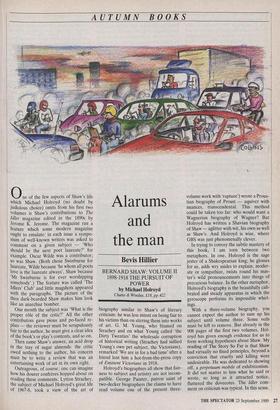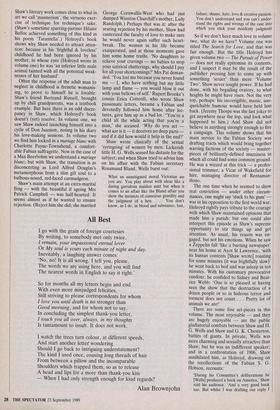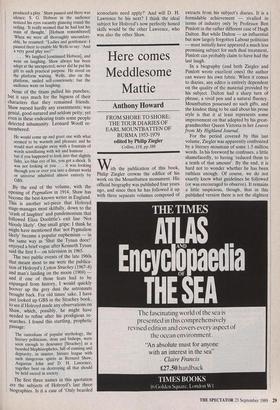AUTUMN BOOKS
Alarums and the man
Bevis Hillier
BERNARD SHAW: VOLUME II 1898-1918 THE PURSUIT OF POWER by Michael Holroyd
Chatto &Windus, £18, pp.422
0 ne of the few aspects of Shaw's life which Michael Holroyd (no doubt by judicious choice) omits from his first two volumes is Shaw's contributions to The Idler magazine edited in the 1890s by Jerome K. Jerome. The magazine ran a feature which some modern magazine ought to emulate: in each issue a sympo- sium of well-known writers was asked to comment on a given subject — 'Who Should be the next poet laureate?' for example. Oscar Wilde was a contributor; SO was Shaw. (Both chose Swinburne for laureate, Wilde because 'he whom all poets love is the laureate always', Shaw because 'Mr Swinburne is for ever worshipping somebody'.) The feature was called 'The Idlers' Club' and little mugshots appeared With the paragraphs. The picture of the then dark-bearded Shaw makes him look like an anarchist bomber.
One month the subject was 'What is the proper role of the critic?' All the other contributors gave pious and p0-faced re- plies — the reviewer must be scrupulously fair to the author, he must give a clear idea of the book's or play's contents, and so on. . Then came Shaw's answer, an acid drop In the tray of sugar almonds: the critic owed nothing to the author, his concern must be to write a review that was an entertaining work of art in its own right.
Outrageous, of course; one can imagine how his dourer confreres hopped about on reading these comments. Lytton Strachey, the subject of Michael Holroyd's great life of 1967-8, took a view of the art of biography similar to Shaw's of literary criticism: he was less intent on being fair to his victims than on stirring them into works of art. G. M. Young, who blamed on Strachey and on what Young called 'the Dirty Twenties' the wholesale corruption of historical writing (Strachey had sullied Young's own pet subject, the Victorians), remarked 'We are in for a bad time' after a friend lent him a hot-from-the-press copy of Eminent Victorians in 1918.
Holroyd's biographies all show that fair- ness to subject and artistry are not incom- patible. George Painter, patron saint of two-decker biographers (he claims to have read volume one of the present three- volume work with 'rapture') wrote a Prous- tian biography of Proust — aquiver with nuances, transcendental. This method could be taken too far: who would want a Wagnerian biography of Wagner? But Holroyd has written a Shavian biography of Shaw — aglitter with wit, his own as well as Shaw's. And Holroyd is wise, where GBS was just phenomenally clever.
In trying to convey the subtle mastery of this book, I am torn between two metaphors. In one, Holroyd is the sage jester of a Shakespearian king; he glosses for us, adds wry asides to explain, moder- ate or sympathize, twists round his mas- ter's wild pronouncements into things of precarious balance. In the other metaphor, Holroyd's biography is the beautifully cali- brated and steady apparatus in which the gyroscope performs its impossible whirl- ings. With a three-volume biography, you cannot expect the author to sum up his subject until volume three. Some veils must be left to remove. But already in the 908 pages of the first two volumes, Hol- royd has given enough evidence for us to form working hypotheses about Shaw. My reading of The Story So Far is that Shaw had virtually no fixed principles, beyond a conviction that cruelty and killing were undesirable. He was dedicated to showing off, a perpetuum mobile of exhibitionism. It did not matter to him what he said or wrote, so long as it attracted notice, fluttered the dovecotes. The Idler com- ment on criticism was typical. In this sense, Shaw's literary work comes close to what in art we call 'mannerism', the virtuoso exer- cise of technique for technique's sake. (Shaw's sometime sparring-partner Hilaire Belloc achieved something of this kind in his poem 'Tarantella'.) Holroyd's book shows why Shaw needed to attract atten- tion: because in his 'frightful & loveless' childhood he had been ignored by his mother, in whose eyes (Holroyd wrote in volume one) he was 'an inferior little male animal tainted with all the potential weak- nesses of her husband'.
Often the response of the adult man to neglect in childhood is frenetic womanis- ing, to prove to himself he is lovable: Shaw's friend Bertrand Russell, brought up by chill grandparents, was a textbook example. But here there is an odd discre- pancy in Shaw, which Holroyd's book doesn't (yet) resolve. In volume one, we saw Shaw indeed launching himself into a cycle of Don Juanism, noting in his diary his love-making sessions. In volume two we find him locked in a =triage blanc with Charlotte Payne-Townshend, a comfort- able Fabian suffragette. Now in the case of a Max Beerbohm we understand a manage blanc; but with Shaw, the transition is as disconcerting as Lord Alfred Douglas's metamorphosis from a slim gilt soul to a bulbous-nosed, red-faced curmudgeon.
Shaw's main attempt at an extra-marital fling — with the beautiful if ageing Mrs Patrick Campbell — was half-hearted. It seems almost as if he wanted to ensure rejection. (Reject him she did; she married George Cornwallis-West who had just dumped Winston Churchill's mother, Lady Randolph.) Perhaps that was it: after the searing rejection by his mother, Shaw had cauterized the faculty of love to make sure he would never again suffer such heart- break. The women in his life became exasperated, and at those moments gave him some home truths. 'No daughters to relieve your cravings — no babies to stop your satirical chatterings, why should I pay for all your shortcomings?' Mrs Pat deman- ded. 'You lost me because you never found me — I, who have nothing but my little lamp and flame — you would blow it out with your bellows of self.' Rupert Brooke's cousin Erica Cotterill, who wrote Shaw passionate letters, became a Fabian and devotedly followed him home after lec- tures, gave him up as a bad lot. "You're a child all the while acting that you're a man,' she accused. 'Why do you act — what use is it — it deceives no deep parts — and if it did how would it help in the end?'
Shaw wrote clinically of the sexual `syringeing' of women by men. Lickerish little H. G. Wells sensed his distaste for the subject; and when Shaw tried to advise him on his affair with the Fabian secretary Rosamund Bland, Wells burst out:
What an unmitigated moral Victorian ass you are. You play about with ideas like a daring garrulous maiden aunt but when it comes to an affair like the Bland affair you show the instincts of conscious gentility and the judgment of a hen . . . . You don't know, as I do, in blood and substance, lust, failure, shame, hate, love & creative passion. You don't understand and you can't under- stand the rights and wrongs of the case into which you stick your maidenly judgment
So if we don't have much love in volume two, what do we have? Volume one was titled The Search for Love, and that was fair enough. But the title Holroyd has given volume two — The Pursuit of Power — does not really epitomise its contents, and I suspect it may be the result of the publisher pressing him to come up with something 'sexier' than mere 'Volume Two'. Shaw never sought power. If he had done, with his beguiling oratory, to what heights he might have risen. Not the very top, perhaps: his incorrigible, manic, uns- quelchable humour would have held him back. (Jeremy Thorpe was the last joker to get anywhere near the top, and look what happened to him.) And Shaw did not believe in anything strongly enough to fire a campaign. This volume shows that his main service to the Fabian Society was drafting tracts which would bring together warring factions of the society — master- pieces of brilliantly-defined muzziness in which all could find some common ground. He was a wizard at this trick — a profes- sional trimmer, a Vicar of Wakefield for hire, managing director of Rentaman- ifesto.
The one time when he seemed to show real conviction — under other circum- stances, one might say 'stuck to his guns' — was in his opposition to the first world war. Holroyd rightly pays tribute to the courage with which Shaw maintained opinions that made him a pariah; but one could also interpret this episode as Shaw's supreme opportunity to stir things up and get attention. As usual, his reason was en- gaged, but not his emotions. When he saw a Zeppelin fall 'like a burning newspaper' near his home at Ayot St Lawrence, 'with its human contents [Shaw wrote] roasting for some minutes (it was frightfully slow)' he went back to bed and was asleep in ten minutes. With his customary provocative candour, he confided to Sidney and Beat- rice Webb: 'One is so pleased at having seen the show that the destruction of a dozen people or so in hideous terror and torment does not count. . . Pretty lot of animals we are!'
There are some fine set-pieces in this volume. The most enjoyable — and they are hugely enjoyable — are the public gladiatorial combats between Shaw and H. G. Wells and Shaw and G. K. Chesterton, battles of giants. In private, Wells was more charming and sexually attractive than Shaw; but he was an indifferent speaker; and in a confrontation of 1906, Shaw annihilated him, as Holroyd, drawing on the recollections of the Fabian S. G. Hobson, recounts:
'During his Committee's deliberations he [Wells] produced a book on America,' Shaw told his audience. 'And a very good book too. But whilst I was drafting our reply I produced a play.' Shaw paused and there was silence. S. G. Hobson in the audience noticed his eyes vacantly glancing round the ceiling. 'It really seemed that he had lost his train of thought,' [Hobson remembered) 'When we were all thoroughly uncomfort- able, he resumed: "Ladies and gentlemen: I paused there to enable Mr Wells to say: 'And a very good play too!"' . . . We laughed [continued Hobson], and went on laughing. Shaw always has been adept at the unexpected; never did he put his gift to such practical purpose. He stood on the platform waiting. Wells, also on the platform, smiled self-consciously; but the audience went on laughing.
None of the titans pulled his punches; but it says much for the bigness of their characters that they remained friends. Shaw nursed hardly any resentments; was genial, good-natured and seldom petty; yet even in these endearing traits some people detected inhumanity. Leonard Woolf re- membered:
He would come up and greet one with what seemed to be warmth and pleasure and he would start straight away with a fountain of words scintillating with wit and humour . . . but if you happened to look into that slightly fishy, ice-blue eye of his, you got a shock. It was not looking at you. . it was looking through you or over you into a distant world or universe inhabited almost entirely by GBS.
By the end of the volume, with the Opening of Pygmalion in 1914, Shaw has become the best-known writer in England. This is another set-piece that Holroyd stage-manages most skilfully, down to the 'crash of laughter' and pandemonium that followed Eliza Doolittle's exit line 'Not bloody likely'. One small gripe: I think he might have mentioned that 'not Pygmalion likely' became a popular euphemism — in the same way as 'Shut the Tynan door!' enjoyed a brief vogue after Kenneth Tynan said the first f— on television in 1965.
The two public events of the late 1960s that meant most to me were the publica- tion of Holroyd's Lytton Strachey (1967-8) and man's landing on the moon (1969) — and if one of those feats had to be expunged from history, I would quickly hoover up the grey dust the astronauts brought back. For old times' sake, I have Just looked up GBS in the Strachey book, to see if Holroyd made any observations on Shaw, which, possibly, he might have needed to refine after his prodigious re- searches. I found this startling, prophetic passage: The custodians of popular mythology, the literary politicians, dons and bishops, were soon enough to denounce [Strachey] as a bearded Mephistopheles, full of cunning and depravity, in sinister, hirsute league with such dangerous spirits as Bernard Shaw, Augustus John and D. H. Lawrence, together bent on destroying all that should be held sacred in society.
The first three names in this quotation are the subjects of Holroyd's last three biographies. Is it a case of 'Only bearded iconoclasts need apply?' And will D. H. Lawrence be his next? I think the ideal subject for Holroyd's now perfectly honed skills would be the other Lawrence, who was also the other Shaw.




























































 Previous page
Previous page